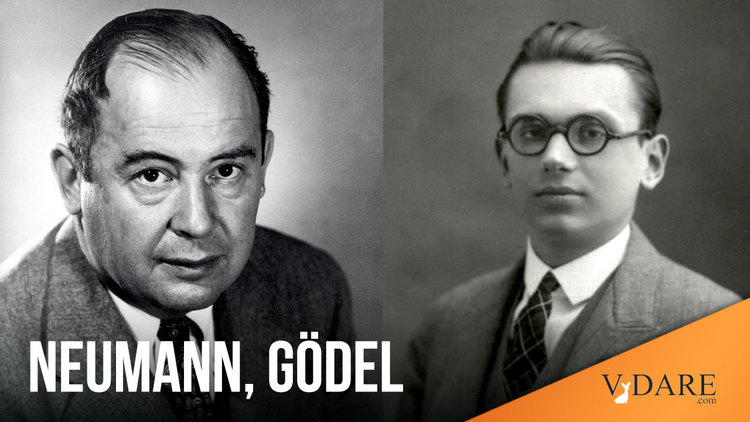


03/31/2022
An interesting aspect of mathematician John von Neumann’s personality was that he was the complete opposite of his friend at the Institute for Advanced Studies, the semi-crazed nerd genius Kurt Gödel. In contrast, von Neumann threw the best parties at IAS and he was beloved by American generals. From a 2000 article in Air Force magazine about General “Bennie” Schriever, the German-born Air Force officer who built, with amazing rapidity, the American ICBM force:
Although an early advocate of missiles, Schriever, now a brigadier general, was well aware of the technical difficulties involved. He was attending a briefing of the Scientific Advisory Board at Patrick AFB, Fla., in 1953 when von Neumann and Edward Teller gave independent presentations indicating the practical possibility of building a nuclear bomb weighing no more than 1,500 pounds.
Schriever recalls, “I almost came out of my seat in excitement, realizing what this meant for the ICBM.”
The breakthrough solved one of Schriever’s most pressing problems-the weight of the nuclear warhead. The proposed ICBM-the Atlas-could now weigh in at as “little” as 220,000 pounds. The weight difference was enormous. It reduced the rocket-engine challenge to manageable proportions. Almost equally important, Teller and von Neumann estimated that the 1,500-pound bomb would yield explosive power of one megaton of TNT, greatly easing the ICBM’s accuracy requirements.
The very limited yields of previously designed warheads generated the requirement for extreme accuracy; the ICBM guidance system would have to produce a Circular Error Probable of about 1,500 feet. With the one-megaton yield, however, accuracy requirements could be relaxed to a CEP of two to three nautical miles. In consultation with others, Schriever increased the estimate of the warhead weight to 3,000 pounds, just to be conservative.
Things began to move rapidly. In May 1954, then Vice Chief of Staff Gen. Thomas White assigned the Air Force’s highest priority to the Atlas. In July, Schriever, Gardner, and von Neumann briefed the Atlas program to President Eisenhower, convincing him to give top national priority to the development of the ICBM.
From Tim Rutten’s review of Neal Sheehan’s 2009 book A Fiery Peace in a Cold War: Bernard Schriever and the Ultimate Weapon:
While Schriever is at the center of Sheehan’s history, the author surrounds him with a compelling — indeed, fascinating — cast of characters whose critical contributions to U.S. security deserve to be honorably remembered. None of these is more mesmerizing and, ultimately, tragic than the great Hungarian-born mathematician and physicist Johnny von Neumann. His formulation of “game theory” would be critical to the Cold War’s nuclear strategy (his mathematical modeling of implosion was a key to the development of the first atomic bomb). As chairman of the committee of scientists and cutting-edge technologists Schriever put together to advise him, Von Neumann would deliver most of the brilliant briefings that convinced then-President Dwight D. Eisenhower to approve the first ICBM program on terms that made its unprecedentedly rapid development possible. A little more than a year later, Von Neumann was dead of cancer. A secular Jew driven from his native land by prewar anti-Semitism, Von Neumann — terrified of oncoming mortality — converted to Catholicism on his deathbed only to be denied burial in Princeton’s Catholic cemetery because he’d divorced his first wife.
Accounts of the great cold warriors like von Neumann are especially fascinating because
Read my new review of the latest von Neumann biography here.